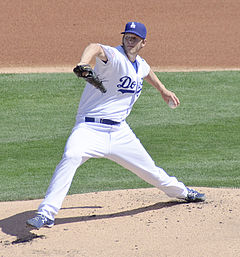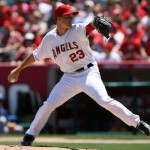One of my pet projects of recent years has been to track “major” Starting Pitcher free agent contracts and then to do analysis of how they turned out, on a Dollar per Win basis. This post is an updated version of this analysis to determine some of the “best” and “worst” free agent contracts ever awarded to starting pitchers. It is updated for 2014 from last year’s version of the post by my putting in all the 2013 data for pitchers, plus putting in the significant 2014 FA contracts. And, per requests I have added in bWAR and $/bWAR for analysis (though, as we’ll soon see, $/bWAR can be tricky to interpret for really poor performing pitchers).
The raw data spreadsheet is available in Google Docs at this link, or along the side of this blog window in the NAR Creation links section. I havn’t cut and pasted any of the data here because the spreadsheet is too “wide” for the blog; I suggest opening it up in a separate tab while reading this post.
Data Taxonomy/caveats: For ease of analysis, I depend on the Average Annual Value (AAV) of the contracts as opposed to trying to figure out exactly how many wins were earned in which year of a varying contract amount. Therefore (for example), Gio Gonzalez‘s contract may have only paid him $3.25M in 2012 but I’m using the full AAV of $8.4M for the purposes of the analysis (it would just be far too difficult to calculate each pitcher’s dollar per win on an annualized basis otherwise). This analysis focuses heavily on dollars per pitcher Win, despite the known limitations of the win stat. There is also dollars per Quality Start and now dollars per bWAR (baseball-reference’s version of WAR).
Here’s some interesting facts, that come out of this analysis (some of these points can also be seen at the amazing Cots Salary database, now at Baseball Prospectus, and are confirmed in my spreadsheet tracking the same):
Largest total Starting Pitcher Contracts ever signed
- Clayton Kershaw‘s new 7yr/$214M deal signed this past off-season.
- It beats out the previous record holder (Felix Hernandez‘s 7 year, $175M extension) by nearly $40M in total value.
- CC Sabathia (7yrs/$161M in 2009) was the longer-time previous record holder before that.
- Zack Greinke (6yr/$147M) and Cole Hamel‘s 6yr/$144M contract deserve mention.
- Masahiro Tanaka signed one of the biggest ever deals (7 year $155M) before he ever threw a MLB pitch.
Largest Single-Season AAV
- Kershaw’s new deal finally beats out Roger Clemen‘s long standing single season record 1yr/$28M deal in 2007 as the largest AAV pitcher contract.
- Justin Verlander‘s new deal gives him an AAV of $28M, a 10% jump up from the $24-$25M/year threshold deals we saw a number of pitchers sign in the last couple of years.
What are some of the Worst Deals ever made? Lets talk about some of these awful deals on a $ per win or $ per bWAR basis. Most of these contracts are well known to baseball fans and are commonly thrown around when talking about the worst historical FA contracts, but they’re fun to revisit. Thanks to the bWAR inclusion, a number of new/more recent contracts now pop up on this list.
- Kei Igawa‘s 2007 deal with the Yankees, which was 5yrs/$20M but included a $26M posting fee, is generally speaking the worst $AAV per Win contract ever signed. Igawa went 2-4 in 13 starts over the life of this 5 year deal, equating to $23M per win for his team. He made exactly one quality start, meaning the Yankees paid $46M per QS.He spent the last two seasons of this contract buried in AAA. For their $46M, the Yankees got a combined -0.6 bWAR out of Igawa.
- Chris Carpenter signed a 2yr/$21M extension in St. Louis before the 2012 season that seemed like a good deal at the time; unfortunately for both sides Carpenter hurt his shoulder, only made 3 starts in 2012, went 0-2 and contributed a -2.3 bWAR in that time. So his dollars per win is infinite and his $/bWAR is uncalculatable. I still rank Igawa’s deal as worse though since it cost his team more than double the dollars, and since Carpenter’s troubles were injury related while Igawa’s was mostly due to performance.
- Jason Schmidt‘s 3yr/$47M contract with the Dodgers. Schmidt made 10 total starts and went 3-6, equating to $15.6M per win. He totaled a -0.5 bWAR during this 3 year contract.
- Oliver Perez made just 21 starts (and got 3 wins in the duration of his 3 year/$36M contract with the Mets. He was released in March of 2011, the final year of the contract, causing the Mets to eat $12M in salary. The Nats picked him up and carried him on their AA roster all year before dumping him as well; he’s now trying to remake himself as a loogy and is in Arizona’s bullpen.
- Matt Harrison‘s current deal (so far) has been pretty expensive for the Rangers: for $11M in salary in 2013 they got just two starts and two bad losses before he hit the D/L and missed the remainder of the season. He still hasn’t returned. Odds are he recovers and has a chance to earn this contract, but you never know with shoulder injuries (though to be fair the injury that cost him 2013 was a ruptured disk in his back).
- Tim Lincecum‘s recently completed 2yr/$40.5M contract was pretty ugly for San Francisco; he went 20-29, had just a 43% Quality Start percentage and contributed -2.3 bWAR over those two seasons for his $40M.
- Barry Zito signed a 7yr/$126M deal. In those 7 years he went 63-80 and contributed just 3.0 bWAR in the lifetime of the contract. That’s $42M per win. By way of comparison, Tanner Roark‘s 5 weeks of effort for the Nats last summer totaled 2.0 wins.
- Mike Hampton‘s injury plagued/ill conceived 7yr/$121M contract resulted in two full missed seasons and just a grand total 3.0 bWAR of value.
- Edwin Jackson and Dan Haren both managed to put up negative bWAR for their 2013 seasons (for which they were both being paid $13M a piece). But those are just one-year deals; they aren’t the multi-year disasters that these other contracts can be.
- Chan Ho Park signed a 5yr/$65M deal with the Dodgers; for those $65M the Dodgers got precisely 0.2 total bWAR in 5 seasons. That’s right; for that money they could have fielded a 4-A pitcher and gotten comparable value. Park was 33-33 during that time and missed significant time with injury.
- Darren Dreifort (6.1M/win and 0.2 bWAR in 5 seasons), Russ Ortiz (4.7M/win and -3.2 bWAR in 4 seasons), Carl Pavano ($4.4M/win and 0.4 bWAR in 4 seasons), and Carlos Silva ($4M/win and -0.7 bWAR in 5 seasons) all had pretty infamous contract disasters too.
How about some of the Best Contracts ever signed? Lots of players have signed small one year deals and won double-digit games, so those really cannot count. Starting with an arbitrary floor of a $50M free agent contract, here’s some of the best value FA contracts ever signed:
- Pedro Martinez: 7yr/$92M, during which he went 117-37 for the Red Sox for a $786k/win total.
- Justin Verlander‘s 5yr/$80M deal from 2010-2014 will be a steal for Detroit: he’s already contributed 25+ bWAR and is at about $888k/win. The same probably will not be said about his mammoth $140M extension.
- Mike Mussina went 92-53 in his 6yr/$88.5M contract for $961k/win.
- Chris Carpenter‘s 4yr/$50.8M deal from 2008-2011 was a steal for St. Louis: He may have missed some time but he still went 44-23 during that contract, contributed 13.6 bWAR and his $/win number was just $1.1M. He’s the only guy who appears in both the “best contracts” and “worst contracts” section in this post.
- Mark Buehrle‘s 4yr/$56 deal from 2008-2011 resulted in about a $1M/win and just $3.2M/bWAR, great value for his team despite his mediocre looking 54-44 record.
- Jered Weaver, Yu Darvish, and Hyun-Jin Ryu deserve mention here; they’re all in the early stages of their long-term contracts and are easily providing value in terms of $/win.
So what does this data mean? Here’s some conclusions when talking about Dollars per Pitcher Win.
- Up to perhaps the mid 2000s, if you got about one (1) pitcher Win per million dollars spent on a player in the Free Agent market that you were doing great.
- Now, if you’re getting anything under $1.5M per win, you should be happy. Especially if you’re paying an ace $25-$30M/year.
- Anything over $2M/win is usually considered a bust. Nearly every contract in the $2M/win in AAV and above has been mentioned and criticized as being a bad contract; the list of “worst ever” above starts at $4M/win and goes higher.
- If you pay a starter anything more than about $25M/season, you’re really going to have a hard time getting value back. There’s only been a handful of 20-game winners over the past 5 years or so, but paying a starter $24M like Greinke is getting is almost certainly going to be regretted at some point. An injury or a lost season completely blows the $AAV/win.
- It illustrates more clearly than anywhere else the value of a top-notch, pre-Arbitration starter. Take Clay Buchholz for example; in 2010 he was 17-7 while earning the league minimum of $443k. That equates to $26,059/win on the same staff that was busy paying Daisuke Matsuzaka $2.06M per win (when adding in the $52M posting fee). Buchholz has struggled with injuries since then, but teams that lock down and depend on these pre-arb starters save untold amounts of FA dollars as a result.
- This analysis is nearly impossible to do across baseball eras because of the general inflation of contracts and especially because of the bonanza of FA dollars being thrown out there right now. Pedro Martinez at the top of his game signed a 7yr/$92M deal. Imagine what he’d get today? It could be three times that considering how good he was in comparison to his counterparts in the mid 90s. He was coming off a 1997 season in which he struck out 305 batters, had a 1.90 ERA, a 219 ERA+ and won the Cy Young award. So going forward a general $1.25M/win is a more accurate barometer for whether or not a pitcher has “earned” his contract. But there’s no easy way to draw a line in the free agency sand and say that before yearX $1M/win was a good barometer while after yearY $1.25M/win is a good barometer.
- A caveat to the $1M/win benchmark; there are different standards for obtaining wins. If you sign a $3M 1 year deal and then subsequently go 3-12 with a 6.00 ERA … while it looks like you reached the $1m/win threshold in reality you were, well, awful. This analysis only really holds up for major FA contracts paying in excess of $10M/year.
And here’s some discussions on Dollars per WAR, since we’ve added that in for this 2014 analysis.
- The general rule of thumb is that “wins” in terms of WAR “cost” is somewhere between $6M and $7M on the open market. Did $6M/win work out in this analysis? Yes and no; it is sort of difficult to do this analysis with players badly underperformed. Take for example John Danks: he’s two years into a 5yr/$65M contract where he’s gotten hurt in both seasons and has just 7 wins and a 0.7 bWAR. Well, $26M in total salary paid so far for 0.7 bWAR equals a $37M/war figure. Well that’s not quite right.
- The best you can do is look at player-by-player examples. Johan Santana‘s 6yr/$137.5M contract cost his team $9M/bWAR. That’s unquestionably bad. Cole Hamels went 17-6 in 2012 on a 1yr/$15M deal, which turned out to be just $3.2M per WAR for his 4.2 bWAR season. That’s great.
- The $/bWAR analysis gets worse if the bWAR is negative; our own Dan Haren came in with a -0.01 bWAR for 2013; how do you decide how much the Nationals paid on a dollar-per-bWAR basis for Haren? If you divide 0.01 into his $13M salary you get a non-sensical -$1.3 billion figure.
Lastly, for comparison purposes, here’s the above analysis looks for the 2013 Nationals pitching staff. Keep in mind that the $/win figures for pre-arbitration pitchers vastly skew the analysis (apologies if this bleeds off the side of the browser screen)
| Last Name | First Name | Total Value (includes guaranteed $) | $$/year AAV | Contract Term | Years Into Contract | Starts | QS | QS % | W | L | $ per start | $ per QS | $ AAV per win | Total bWAR | $ per bWAR |
| Strasburg | Steven | $19,000,000 | $4,750,000 | 2009-13 | 5 | 75 | 46 | 61.3% | 29 | 19 | $316,667 | $516,304 | $818,966 | 8.5 | $2,794,118 |
| Gonzalez | Gio | $42,000,000 | $8,400,000 | 2012-16 | 2 | 64 | 43 | 67.2% | 32 | 16 | $262,500 | $390,698 | $525,000 | 7.9 | $2,126,582 |
| Zimmermann | Jordan | $5,350,000 | $5,350,000 | 2013 | 1 | 32 | 21 | 65.6% | 19 | 9 | $167,188 | $254,762 | $281,579 | 3.7 | $1,445,946 |
| Detwiler | Ross | $2,337,500 | $2,337,500 | 2013 | 1 | 13 | 6 | 46.2% | 2 | 7 | $179,808 | $389,583 | $1,168,750 | 0.1 | $23,375,000 |
| Haren | Dan | $13,000,000 | $13,000,000 | 2013 | 1 | 30 | 15 | 50.0% | 10 | 14 | $433,333 | $866,667 | $1,300,000 | 0.0 | (0 war) |
| Maya | Yunesky | $8,000,000 | $2,000,000 | 2010-13 | 4 | 10 | 1 | 10.0% | 1 | 4 | $800,000 | $8,000,000 | $8,000,000 | -0.8 | ($10,000,000) |
| Karns | Nathan | 490,000 | 490,000 | 2013 | 1 | 3 | 0 | 0.0% | 0 | 1 | $163,333 | (0 QS) | (0 wins) | -0.4 | ($1,225,000) |
| Jordan | Taylor | 490,000 | 490,000 | 2013 | 1 | 9 | 3 | 33.3% | 1 | 3 | $54,444 | $163,333 | $490,000 | 0.0 | (0 war) |
| Ohlendorf | Ross | 1,000,000 | 1,000,000 | 2013 | 1 | 7 | 3 | 42.9% | 3 | 1 | $142,857 | $333,333 | $333,333 | 0.9 | $1,111,111 |
| Roark | Tanner | 490,000 | 490,000 | 2013 | 1 | 5 | 4 | 80.0% | 3 | 1 | $98,000 | $122,500 | $163,333 | 2.0 | $245,000 |
The counting figures for Starts/QS/Wins/Losses are cumulative for the life of whatever contract the player is on. So for Strasburg, he was basically in the 5th year of his original 5 year deal, hence the 75 total starts in those 5 years.
The 2013 Nats have $AAV per win and $/bWAR mostly on the good side:
- Yunesky Maya and Nathan Karns both contributed negative bWAR for 2013, so their numbers are meaningless.
- Taylor Jordan and Dan Haren both came in at zero (or close enough to it) bWAR, so their numbers are also meaningless. Well, not “meaningless” in Haren’s case: basically he gave the team replacement performance for his $13M in salary; the team could have just called up a guy from AAA and let him pitch all year and gotten about the same value. Thanks for the memories!
- The best $/win guy was Tanner Roark, who got 3 wins for his MLB minimum salary … and that’s not even taking into account the fact that Roark’s 2013 salary probably should be pro-rated for this analysis.
- The worst $/win guy was Maya; who demonstrated yet again that his $8M contract was a mistake.
- Nearly the entire staff has $/win values under the “you’re doing well” threshold of $1M/win. And nearly the whole squad is doing $/bWAR well below the $6M/bWAR range.



